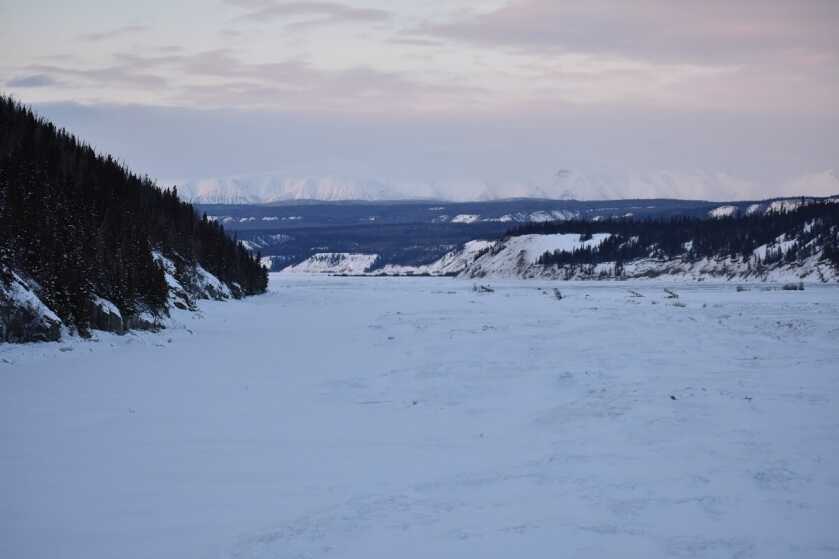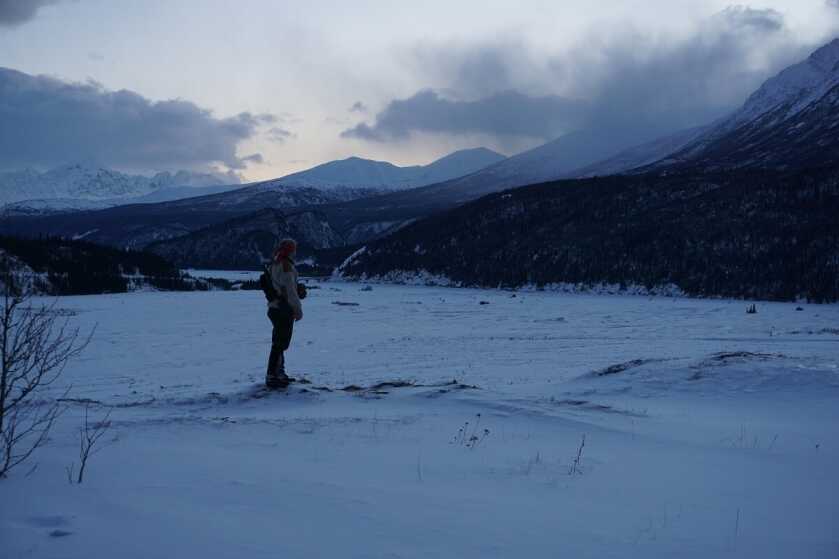
I followed my father the last few feet of cover before we broke into the opening of a small, frozen lake, our anticipation red-lined at the highest level it had reached in days. As the alders thinned enough for limited visibility, Dad’s head snapped around to me, “I see one!” he hissed.
It was the sixth day of an Alaska bison hunt that had thrown numerous challenges at us requiring an ever-evolving plan; we’d blown through Plans A, B, and C and were currently throwing a Hail Mary as our days afield came to a close. Our idea of foregoing mechanical transportation for snowshoes and still-hunting a series of pothole lakes had paid off with the only sighting thus far of our quarry. With an either-sex tag in his pocket, Dad extended his shooting sticks and sat down behind his rifle. The bulls edged toward the dense mass of cover surrounding the lake.
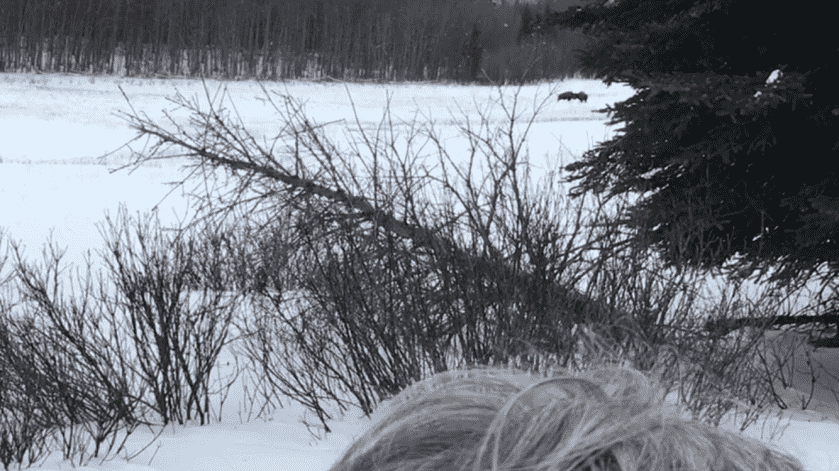
My father grew up on a small ranch on a North Dakota river bottom. One of nine children tasked with helping put food on the table from a young age, his first hunting memories were of still-hunting cottontails through the thickets that dotted the countryside over a mile from home at the ripe old age of seven. Rarely eating the beef and mutton they raised as it was worth more to sell in town, everything from rabbits, deer, or the occasional raccoon or beaver was on the menu. Times were tight for the first few years of his life and he still talks about how exciting it was to get indoor plumbing when he was in grade school. Stinky shoes from a weekend trapline led to “Beating up the bully’s hands with [his] face” as the inevitable teasing began Monday morning at the small country school about his aromatic attire.
Moving off of the ranch to go to college and get married landed our family years later in Montana and him sharing the love of the outdoors with his young brood. I in particular fell in love with the adventure of hunting camps and the sharp smell of woodsmoke and horse sweat as we saddled up for another day of adventure by headlamp. As I grew and developed my own interests, hunting always brought us together in the fall. We even began venturing out of state on our pursuits as life circumstances improved.
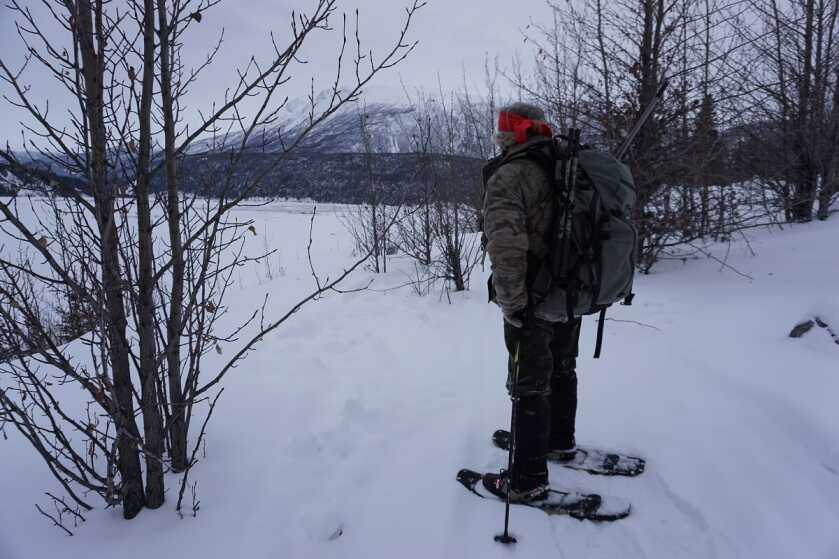
Last year we applied for several tags in Alaska and when the dust from the draw settled, there was a literal once-in-a-lifetime American bison tag with the name Owen Voigt printed on it. Alaska’s largest land mammal got its start when twenty-three plains bison were trucked, then barged to coastal Alaska in 1928. The native Montana animals were then taken to Delta Junction and released where their ancestors still live today. Due to the success of the introduction, three other herds have been introduced and are thriving allowing a small amount of hunting each year. This meant the bison we were to be pursuing carried the bloodline of our home state animal, a detail I found intriguing about the experience. Among all of the species Alaska has available to hunt, the bison is one of the most coveted. The state allows successful non-resident applicants a once-in-a-lifetime opportunity to pursue one of the now nine hundred bison.
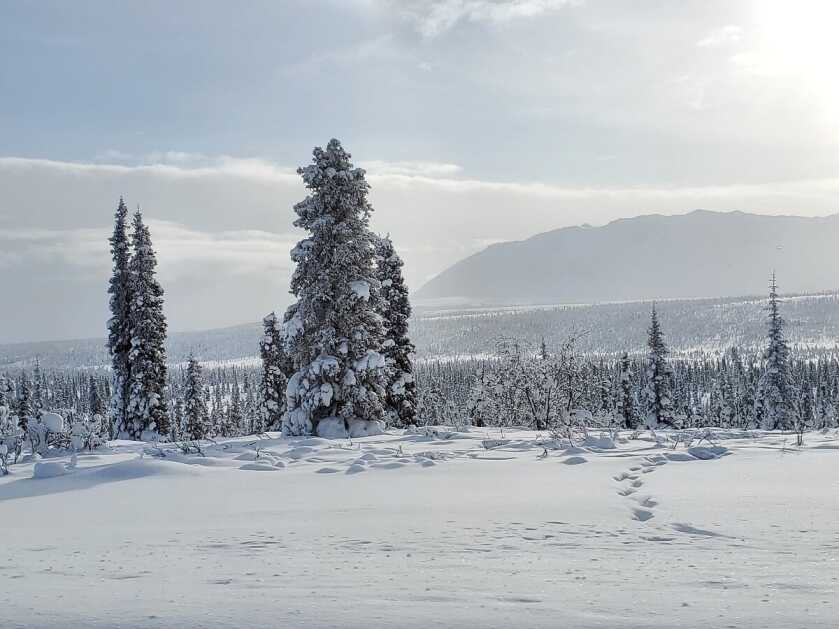
It’s important to note that Wood bison are native to Alaska but were extirpated in the 1800s although a reintroduction took place in 2015 in the southwestern portion of the state with limited success. The herd continues to try to gain a foothold and improve its yearly recruitment numbers of calves while learning to better adapt to the weather and predators.
Once the initial excitement of the draw wore off, we turned our attention to the logistics of how to harvest and responsibly take care of a potential two-thousand-pound animal. A mature bull can offer up to seven hundred pounds of useable meat so forethought and proper equipment were a necessity. Thankfully, the liberal season length allowed us to mesh work schedules and travel plans, arriving in the Copper River Basin region to hunt in mid-February. After consulting with previous tag holders, the local biologist, and area residents, we decided to use the frigid Alaska winter to our advantage by waiting for the waterways to freeze and utilizing snowmobiles to access the hunting area. Historically, the bison could be found feeding on windswept bluffs. With some careful hunting and luck it would be possible, albeit still difficult, to snowshoe or sled quarters out to a frozen river then utilize snowmobiles for the remainder of the journey.

The sleds we pulled behind our machines were loaded down with packs, food, rope, and axes as we ran our snowmobiles onto the Copper river for the first time, futilely trying to navigate its angry topography. Picking through ice fields sporting pieces the size of dinner tables thrown up against each other juxtaposed with hockey-arena sized glare ice patches tested our wherewithal. More comfortable on horseback than a snowmobile, my forearms burned with the effort of wrestling a bucking machine rather than a bronc. Our research narrowed the focus to a specific river drainage we were hoping to spend the week in yet a multitude of older tracks on the ice alluded to our first big hiccup. Other hunters had the same idea as us yet to reach the confluence of rivers, one had to find a passage through a narrow canyon where the river channel was deep enough to have remained partially thawed despite the twenty-below zero nights of late. The tracks were of other hopeful bison hunters who had been turned back by the river’s unwillingness to give up her running water so easily.
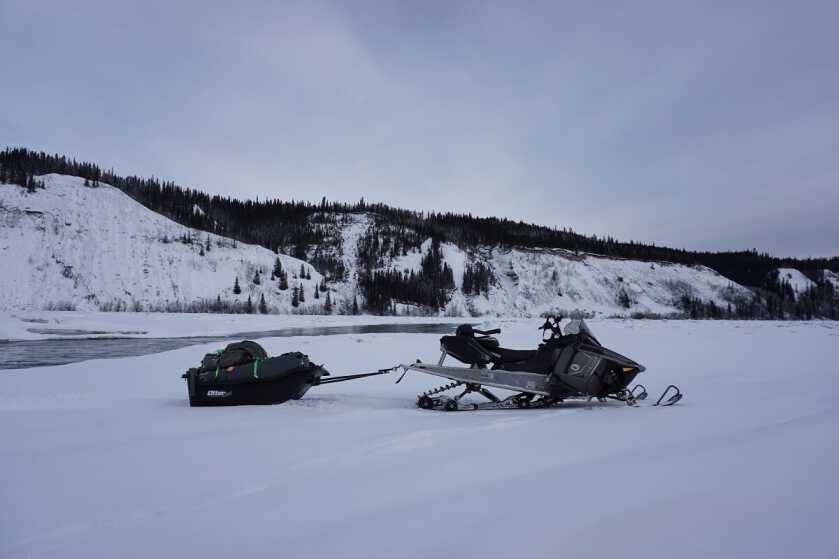
A day and a half of trying different routes, moving deadfall, and scouting ahead left us no nearer our goal yet maddeningly close, staring across an open river channel at our intended destination. Switching gears, we stayed above the river canyon and glassed hoping to locate a bull feeding in an accessible spot. After days of no success, we knew we had to switch it up yet again and try to make our own luck. Having discovered several small lakes within walking distance on an online mapping program, we tentatively made our way across the ice on foot. Moving downriver the water braids ran more shallow thus freezing and allowing safe passage. A several-hour snowshoe trek put us on the first lake, with the only bison spotted all week in range.
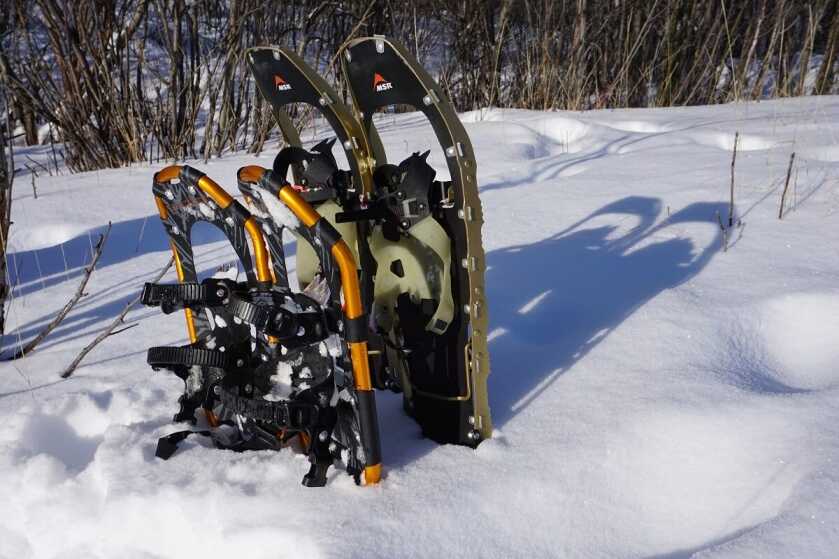
As Dad quickly got set up, the bulls turned to the brush and walked side-by-side up into the dense cover. There hadn’t been time for an ethical shot as neither bull stepped clear of the other. We waited hopefully for them to reappear and replayed the moment over and over, futilely willing another opportunity. Sitting at the opening for the remainder of the afternoon left us no closer to our intended animal as we solemnly strapped into our snowshoes for the walk out. Quadriceps began to lock up tight due to having ran out of drinkable water hours before we reached our vehicle as we climbed the river cut bank in the dark. What water we hadn’t consumed had frozen in our bottles and finding our carefully-wrapped emergency stash rock hard added insult to injury.
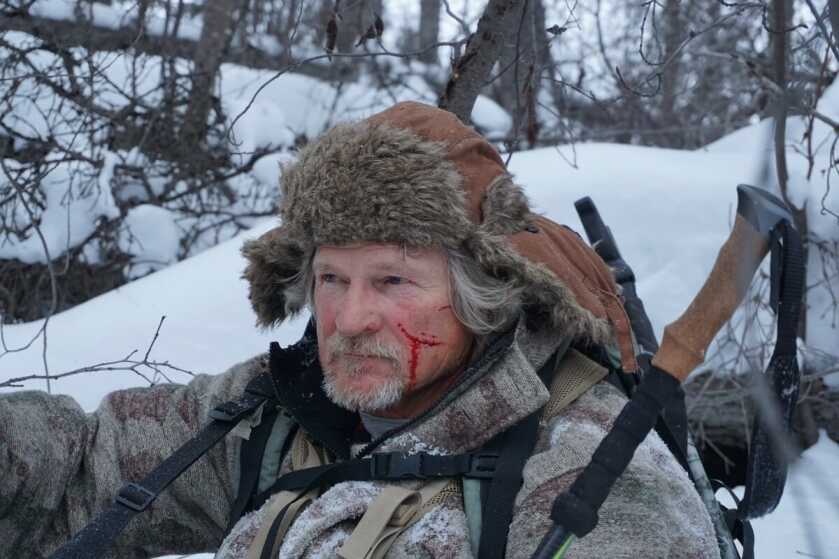
The following morning was our last. Having found safe passage for the snowmobiles across the river ice, we cut our hike almost in half. Safely across the biggest obstacle, I turned my attention to a narrow spot in the trail that was exacerbated by a washout. Navigating the thirty feet of trail would put us within a short ride of our planned jumping off point, misjudging it would send the sled and rider down a forty-foot bank to the river frozen below. My father led the way, made it, and stopped to wait for me. Trying to ignore my flipping stomach, I hit the throttle and leaned uphill. The sled responded and I was committed. Halfway across the cut, leaning uphill and keeping my eyes ahead, I felt the snowmobile begin to tip. I wrenched on the handlebars with as much force as I could muster but it wasn’t enough. The sled hit it’s tipping point. I felt it going, launched myself uphill, and prayed I wouldn’t hang up on it. Landing on my back, I blinked the stars out of my eyes. I heard crunching snow as Dad ran back downhill. Before I could compute the cost of a new snowmobile and how I was going to explain it to my wife, a hand grabbed me by the jacket and pulled me to my feet. The machine hung precariously on the cut bank but allowed two guys, one’s bell rung thoroughly, to coax it back onto the trail.
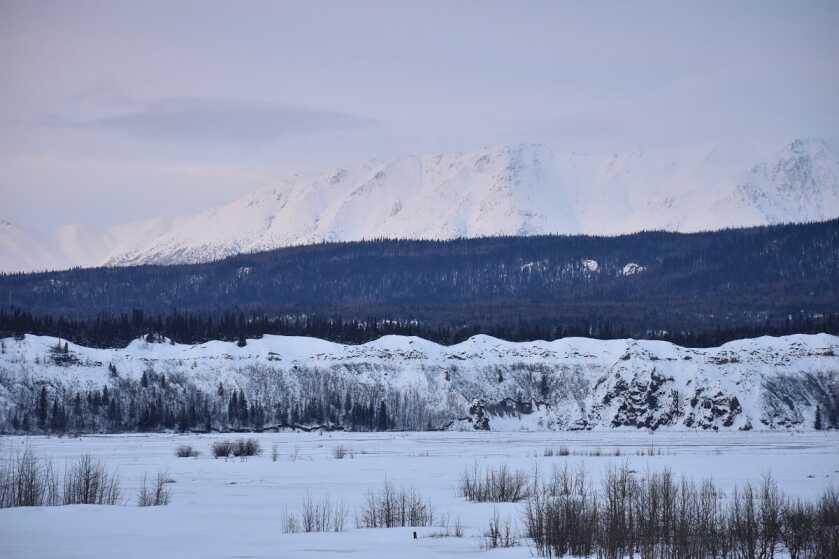
Several hours later found us back at the lakes, hoping the bulls hadn’t ventured far. After circling through the various potholes, the sign was apparent, the bison moved off during the night and left us behind, questioning our decision. Should we have found this small canyon sooner and been hunting it more of the week? Was there a split-second window when a bullet would have flown true, yet not risked wounding the other bull? Despite our second-guessing, the results remained the same. We were going home heavy-hearted and light-packed.
As the sun set on our final day, we put our snowshoes on for the long walk to the snowmobiles in the half-light. I snapped a few pictures of my father as he started back up the trail, a North Dakota ranch kid raised with a respect for animals that transcended the depth of his wallet. Having head shot cottontails for the supper pot his entire youth, a target the size of the proverbial barn door would not have been a challenge but the risk of wounding the other of these spectacular creatures kept his finger off of the trigger and an unpunched tag in his pocket.
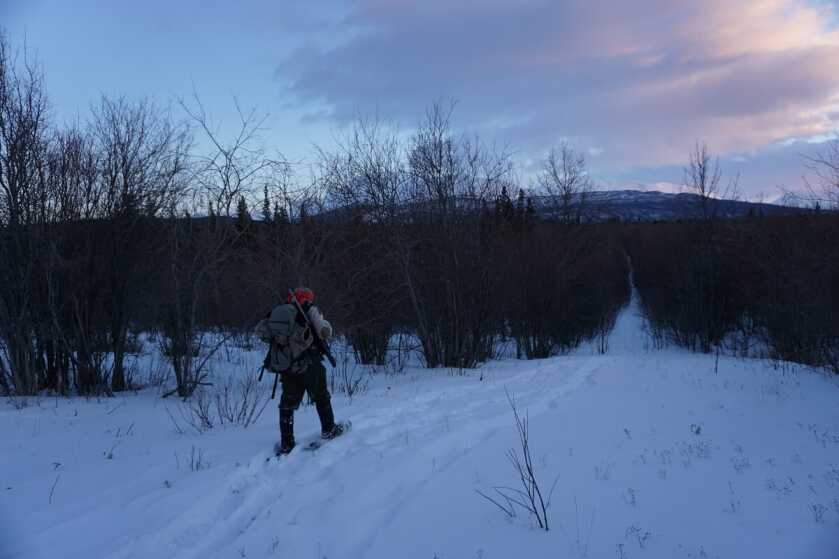
Alone with my thoughts as we marched on, I felt a sense of remorse- it had been my idea to apply for the almost impossible-to-draw tag and I knew how hard my father worked to make this hunt happen. Time off of work, saving, and planning for over a year was now in the rearview mirror and unable to be salvaged. Although returning home without our intended target, I was damn glad to be going home with a man like him.
